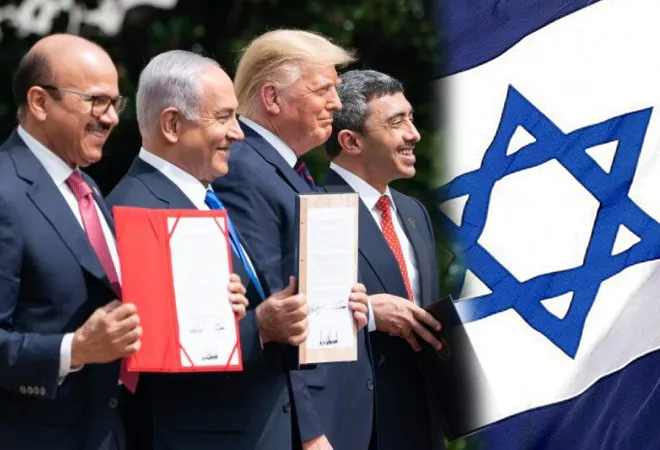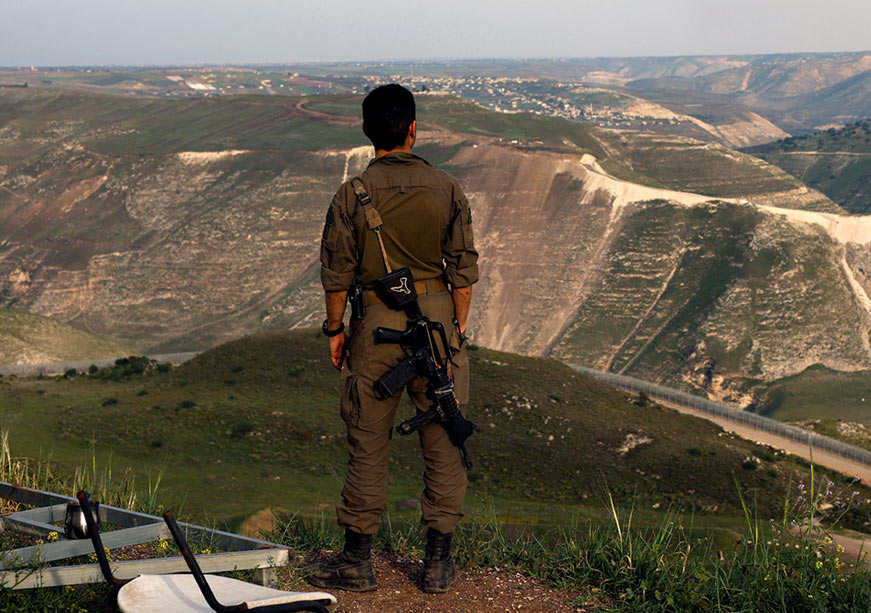With strong convergences of strategic interests, military-security cooperation looks promising between Israel, the United Arab Emirates, and Bahrain.
In the recent history of Israel’s political and diplomatic journey, its normalisation of relations with two key Gulf Cooperation Council (GCC) countries—the United Arab Emirates (UAE) and Bahrain—in August-September 2020, famously known as the Abraham Accords, is a breakthrough. Facing isolation in its own region since 1948, the emerging realignment of relations holds extreme significance for Israel. It also signals the changing dynamics of the geopolitical, geoeconomic, and security landscape of the wider Middle East, where efforts are still underway to consolidate and expand cordial relations between like-minded countries based on shared strategic interests. The accords are gradually opening important avenues for cooperation between these countries in several domains, one of them being military–security ties, including defence trade.
It was mainly the closely-guarded Indo-Israeli arms trade that dominated the ties for a prolonged period, until they came out of the closet in the early 2010s, and overall military–security cooperation getting more robust since mid-2014.
Lately, shared threat perceptions, emanating mostly from Iran’s controversial nuclear programme and its expanding “strategic depth” in the Middle East have paved the way for the rapprochement. Territorial and existential threats (particularly for Israel) have also been attributed to the establishment of tacit security cooperation (including intelligence sharing) between Israel and a few GCC countries recently. Now, the normalised relations will give Israel leeway to deepen those ties and also tap the defence markets of these two countries. Right from the early and mid-1950s, arms sales have remained an important instrument of Israeli foreign policy. In a few cases, such arms sales diplomacy had even led to the eventual establishment of diplomatic relations, which was the case with the People’s Republic of China in January 1992. Likewise, it was mainly the closely-guarded Indo-Israeli arms trade that dominated the ties for a prolonged period, until they came out of the closet in the early 2010s, and overall military–security cooperation getting more robust since mid-2014. The centrality of arms sales, therefore, in the pursuit of foreign policy objectives continues to be relevant and significant for Israel. Until recently, arms trade (and military cooperation) between Israel and the Gulf states are unthinkable, but following the accord, there have been indications of such engagements gaining momentum. The intrinsic linkages between Israel’s arms sales and its foreign, political, and economic policies have been aptly discussed by scholars like Aaron S. Klieman in his widely-acclaimed book Israel’s Global Reach: Arms Sales as Diplomacy (1985) in these words: “The military rationale for transferring Israeli weapons in effect served as the intermediate link between political and foreign policy incentives on the one hand, and economic motives, on the other.” For Israel, the normalisation could prove to be lucrative for its defence industries which develop some of the world’s most advanced military technologies. The Abraham Accords allow Israel to explore possibilities of establishing military-industrial cooperation with the two GCC states, which are augmenting their military capabilities through imports as well as by striving towards developing their own local military industries for self-sufficiency. Given this, joint-collaboration ventures between Israeli, Bahraini, and Emirati defence industries are in the offing alongside imports of certain defence items from Israel. The accords have also opened an important window for “extended cooperation, sharing of knowledge, promoting investment, development and localization of joint technology” between these countries, which are technologically and economically advanced in their own ways. Some of the sophisticated weapons systems, exported by Israel, such as missiles, air defence systems, Unmanned Aerial Vehicles (UAVs), reconnaissance radars and missile-defence radars (such as the Green Pine system), and various types of arms and ammunitions, are few types of items which are increasingly being sought by these two countries, given the existing nature of threat perceptions.
Joint-collaboration ventures between Israeli, Bahraini, and Emirati defence industries are in the offing alongside imports of certain defence items from Israel.
Owing to the missile/drone attacks by Yemen-based Houthi militias, believed to be financially and logistically backed by Iran, the UAE aims to bolster its air defence system, with military purchases from external vendors, including Israel. The UAE and Bahrain have reportedly discussed a possible procurement of the Israeli-made Iron Dome and Green Pine for defence against any incoming ballistic missile threats. Such security challenges are furthering forward the Israeli-Emirati military-security cooperation (including industrial ventures). The same could be witnessed with Bahrain, in the wake of Israel’s first Memorandum of Understanding (MoU) signed with a Gulf country in February 2022, supporting “any future cooperation in the areas of intelligence, mil-to-mil, industrial collaboration and more.” This formalisation of defence relations carries the scope to widen the cooperation in a wide range of spheres, and not only restricted to the seller-buyer relationship. In the near term, Israeli-made UAVs and anti-drone systems will likely be procured by Bahrain to protect its critical infrastructures from any kinetic military actions. It also appears that Israel’s cooperation with these two countries is going to extend to the maritime security domain due to the increasing threats in the Persian Gulf and the Red Sea, which are not only important routes for international sea trade but they are also crucial to Israel’s communication and commercial dealings with its Asian and African partners. Now, with the realigned regional geopolitics and the growing cordiality, potential military sales to the two Gulf markets will help boost Israel’s arms-export revenues, which continue to remain one of the most important sources for its economic growth alongside its non-defence trade. It is crucial for Israel as it has a limited capacity to absorb its indigenously developed armaments, and therefore, is always in a quest for clients to export the surplus defence products. For more than a decade, Israel has consistently ranked among the top 10 defence exporting countries, and its arms export volume touched US$11.3 billion in 2021 while it was US$8.3 billion in 2020. Reportedly, the UAE and Bahrain accounted for 7 percent of the total exports in 2021, 41 percent for Europe, 34 percent for Asia-Pacific, 12 percent for North America, and 3 percent each for Africa and Latin America. In 2021, at 20 percent, missiles, rockets, and air defence systems constituted the largest portion of Israel’s weapons exports while UAVs, drones, radar, and electronic warfare systems (EWS) amounted to 9 percent of the total arms sales. With the UAE and Bahrain emerging as its new markets, the revenue that Israel will generate from arms sales will be important for funding its defence research and development (R&D) programmes as the government requires an uninterrupted flow of foreign earnings coming into the country.
Israel has consistently ranked among the top 10 defence exporting countries, and its arms export volume touched US$11.3 billion in 2021 while it was US$8.3 billion in 2020.
While the 2020 Accord raises the prospects for an arms trade between Israel and both the GCC states, Israel can face competition (at later stages) from traditional and new arms exporters to the Middle East, but mostly in missiles, anti-missiles, drones/UAVs, radars, domains. The United States (US) remains the largest arms supplier for most of the regional countries. The Middle East accounted for 43 percent of its total arms exports in 2017–21, with Saudi Arabia and the UAE as the two largest recipients. Moreover, the steady growth in the arms trade between China (an emerging exporter) and some of the Middle Eastern countries (including the UAE) could pose a competition to Israeli defence exporters in the long run. China has gradually begun tapping the markets in the region by exporting its UAVs/drones (such as Wing Loong I, Wing Loong II, CH-4, and CR500 Golden Eagle) to customers, including the UAE and Saudi Arabia. It is also making unrelenting efforts to increase its technology transfers and strengthen its defence industrial cooperation with more countries in the Middle East. With its ever-widening economic and technological footprints in the region, it will compete with other arms suppliers, including Israel, at some period. The restrictive US arms sales policies (mainly for armed drones) have pushed countries like the UAE to look for available alternatives with fewer strings attached. This is an important void that China hopes to fill, and Israel also will aspire to transfer similar items to its new clients to carve a niche in the region. Nevertheless, Israel and the aforementioned GCC countries will continue to explore all the possible areas to cooperate in the military-security sector, and not let any third-party factor hamper the further expansion of their newly-established diplomatic ties. It is within such a framework that Israel will endeavour to secure lucrative arms deals with the two energy-rich countries. The quest for their own technological advancement in the defence industry provides an incentive to the UAE and Bahrain to solidify ties with Israel. Their respective bilateral relationships will also continue to be driven by their military-security defence ties and shared security challenges. With strong convergences of strategic interests, military-security cooperation looks promising, and Israel’s arms deal with both these countries can be expected to flourish gradually.












